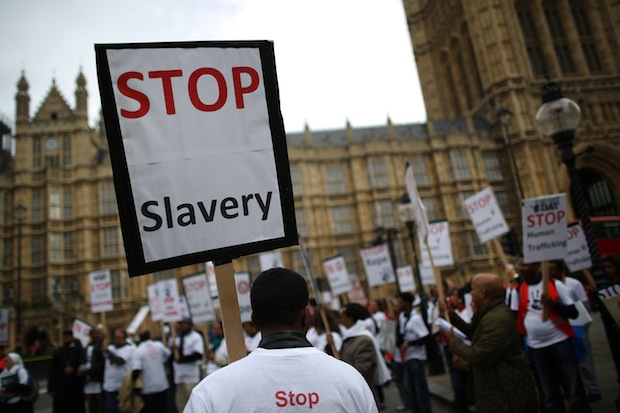[audioplayer src=”http://traffic.libsyn.com/spectator/TheViewFrom22_3_July_2014_v4.mp3″ title=”Frank Field and Isabel Hardman discuss the Modern Slavery Bill” startat=1865]
Listen
[/audioplayer]Who would have expected to find slavery on the outskirts of Cardiff? Not the locals, who were shocked when police carried out a raid while investigating the case of two men understood to have been held in captivity for 26 years. ‘Human trafficking is becoming more prevalent across the United Kingdom,’ said Gwent Police. That’s one way of putting it. Another is to say it has been prevalent for years, but the authorities are only now beginning to take notice.
The last government was more interested in apologising for the old form of slavery than recognising the new one. Tony Blair’s 2006 apology for the slave trade was all the more bizarre because Britain ended, rather than started, the business. Slavery is a worldwide phenomenon, controversial nowhere until the 18th century. Then a bunch of Christians in Clapham kicked up a fuss (with a similar movement in America) and William Wilberforce took up the cause. Britain outlawed the slave trade and the Royal Navy stamped it out.
But slavery has not been defeated. Men and women, girls and boys are still trapped, traded and forced into involuntary service as sex workers, labourers and sometimes soldiers. And it has taken a Conservative minister, Theresa May, to put slavery back on the agenda. Her Modern Slavery Bill, the sole redeeming feature of the recent Queen’s Speech, will again put Britain in the forefront of the fight against slavery by calling this evil by its name, identifying it properly, and equipping police and judges with the powers they need to fight it.
The problem until now has been that slaves are not always recognised as such, even when they arrive in a police station asking for help. A report by the Centre for Social Justice, whose work on the subject helped form the Home Secretary’s agenda, took evidence from police. One deputy chief constable spoke about a girl who escaped from a brothel and turned up at a police station with no passport. ‘Under these confusing circumstances we chose to arrest her for being an illegal immigrant,’ he admitted. Under the old ‘performance indicators’, which have come to dictate police priorities, there was more incentive to investigate the theft of a Mars bar than a case of human trafficking.
Even when the police do act, the laws make convictions very hard (which means that the guilty are far less likely to be prosecuted). Take Operation Ruby, when 200 officers were involved in a swoop on a leek farm in Northamptonshire. They made 13 arrests and spent three years building a case — yet there were just two convictions. The prosecution could only use a jumbled assortment of sexual offences acts, trafficking law and immigration law. The gaps in the law are so wide that modern-day slave drivers have been effectively free to operate. When legal immigration runs at 1,400 people a day, it’s fairly easy to sneak in a few slaves.
The Home Secretary’s proposals are robust and far-reaching. The Modern Slavery Bill would issue instructions that human traffickers are to be considered as being as dangerous as arms dealers. All police will be given clear guidance on how to recognise someone who has been trafficked, and instructed not to prosecute those who are here illegally. They are often desperate young people who pay for passage into Britain and the promise of work, only to find that their passports are confiscated and their ‘work’ consists of forced labour. In theory, it is to repay the costs of passage. In practice, it is indentured slavery. A 28-year-old trafficking victim recently told Northampton Crown Court that he was forced to work in a nail bar to pay off the £23,000 cost of his transport to Britain.
So far Ms May has led the way. Even calling modern slavery by its name is a huge step forward: Wilberforce would have made no progress had he spent his time mumbling about ‘human trafficking’. Such euphemisms can confuse the issue, since Britons, too, can be taken as slaves. Three years ago, four men were found guilty of keeping vulnerable British men, who were homeless or drug addicts, in servitude. They were forced to work for nothing, up to 19 hours a day, were underfed and made to sleep in horse boxes.
There is a major flaw in what the Home Secretary currently proposes, however. A vital part of tackling modern slavery is confronting businesses that use slaves. Today there is considerable uproar if some horse meat is found in lasagne, but we tend not to worry about our prawns being supplied through the use of slavery in Thailand. The ask-no-questions approach in globalised food and clothing industries allows modern slavery to exist. In California, businesses with sales of over $100 million are required to question their suppliers, and seek proof that their wares were produced without slaves. The same could be done in Britain.
As things stand, there is no such requirement. David Cameron and George Osborne are understood to believe that such a request is anti-business: not so. It’s anti-slave, which is why Sir Richard Branson and others back the idea of a slavery audit. The Labour party looks likely to insert this amendment into Mrs May’s legislation. The issue should not be party political, but it would reflect badly on the Conservatives if they needed to be forced by Labour into making the legislation sufficiently robust. A small amendment to Mrs May’s bill would ensure that Britain could stamp out the new slavery as surely as we did the old kind.





Comments